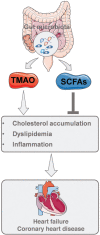Gut microbiota and microbiota-derived metabolites in cardiovascular diseases
- PMID: 37442759
- PMCID: PMC10538883
- DOI: 10.1097/CM9.0000000000002206
Gut microbiota and microbiota-derived metabolites in cardiovascular diseases
Abstract
Cardiovascular diseases, including heart failure, coronary artery disease, atherosclerosis, aneurysm, thrombosis, and hypertension, are a great economic burden and threat to human health and are the major cause of death worldwide. Recently, researchers have begun to appreciate the role of microbial ecosystems within the human body in contributing to metabolic and cardiovascular disorders. Accumulating evidence has demonstrated that the gut microbiota is closely associated with the occurrence and development of cardiovascular diseases. The gut microbiota functions as an endocrine organ that secretes bioactive metabolites that participate in the maintenance of cardiovascular homeostasis, and their dysfunction can directly influence the progression of cardiovascular disease. This review summarizes the current literature demonstrating the role of the gut microbiota in the development of cardiovascular diseases. We also highlight the mechanism by which well-documented gut microbiota-derived metabolites, especially trimethylamine N-oxide, short-chain fatty acids, and phenylacetylglutamine, promote or inhibit the pathogenesis of cardiovascular diseases. We also discuss the therapeutic potential of altering the gut microbiota and microbiota-derived metabolites to improve or prevent cardiovascular diseases.
Copyright © 2023 The Chinese Medical Association, produced by Wolters Kluwer, Inc. under the CC-BY-NC-ND license.
Conflict of interest statement
None.
Figures



Similar articles
-
The role of gut microbiota in cardiovascular diseases and their potential as novel therapeutic targets.J Cardiol. 2025 Aug;86(2):141-147. doi: 10.1016/j.jjcc.2025.05.002. Epub 2025 May 21. J Cardiol. 2025. PMID: 40409712 Review.
-
Gut microbiota, metabolites, and pulmonary hypertension: Mutual regulation and potential therapies.Microbiol Res. 2025 Oct;299:128245. doi: 10.1016/j.micres.2025.128245. Epub 2025 May 29. Microbiol Res. 2025. PMID: 40480048 Review.
-
Microbiota in Gut-Heart Axis: Metabolites and Mechanisms in Cardiovascular Disease.Compr Physiol. 2025 Jun;15(3):e70024. doi: 10.1002/cph4.70024. Compr Physiol. 2025. PMID: 40542540 Free PMC article. Review.
-
Gut microbiota-derived metabolite phenylacetylglutamine in cardiovascular and metabolic diseases.Pharmacol Res. 2025 Jul;217:107794. doi: 10.1016/j.phrs.2025.107794. Epub 2025 May 21. Pharmacol Res. 2025. PMID: 40409519 Review.
-
Interplay of gut microbiota in Kawasaki disease: role of gut microbiota and potential treatment strategies.Future Microbiol. 2025 Mar;20(4):357-369. doi: 10.1080/17460913.2025.2469432. Epub 2025 Feb 27. Future Microbiol. 2025. PMID: 40013895 Review.
Cited by
-
Study on the mechanism of acupuncture to improve mild cognitive impairment in hypertension by regulating intestinal microbiome.Front Neurosci. 2024 Dec 23;18:1495384. doi: 10.3389/fnins.2024.1495384. eCollection 2024. Front Neurosci. 2024. PMID: 39764388 Free PMC article. Review.
-
Recent Advances in Microbiota-Associated Metabolites in Heart Failure.Biomedicines. 2023 Aug 21;11(8):2313. doi: 10.3390/biomedicines11082313. Biomedicines. 2023. PMID: 37626809 Free PMC article. Review.
-
The Mediterranean Diet, Its Microbiome Connections, and Cardiovascular Health: A Narrative Review.Int J Mol Sci. 2024 Apr 30;25(9):4942. doi: 10.3390/ijms25094942. Int J Mol Sci. 2024. PMID: 38732161 Free PMC article. Review.
-
Trymethylamine-N-oxide, a gut-derived metabolite, induces myofibroblastic activation of valvular interstitial cells through endoplasmic reticulum stress.bioRxiv [Preprint]. 2025 Feb 11:2025.02.06.636980. doi: 10.1101/2025.02.06.636980. bioRxiv. 2025. PMID: 39975143 Free PMC article. Preprint.
-
The Gut Microbial System Responds to Retinal Injury and Modulates the Outcomes by Regulating Innate Immune Activation.Invest Ophthalmol Vis Sci. 2025 Jul 1;66(9):6. doi: 10.1167/iovs.66.9.6. Invest Ophthalmol Vis Sci. 2025. PMID: 40600763 Free PMC article.
References
-
- Ding YN, Tang X, Chen HZ, Liu DP. Epigenetic regulation of vascular aging and age-related vascular diseases. Adv Exp Med Biol 2018; 1086:55–75. doi: 10.1007/978-981-13-1117-8_4. - PubMed
-
- Garcia de Tena J. Inflammation, atherosclerosis, and coronary artery disease. N Engl J Med 2005; 353:429–430. doi: 10.1056/NEJM200507283530425. - PubMed
-
- Mossad O, Batut B, Yilmaz B, Dokalis N, Mezö C, Nent E, et al. . Gut microbiota drives age-related oxidative stress and mitochondrial damage in microglia via the metabolite N(6)-carboxymethyllysine. Nat Neurosci 2022; 25:295–305. doi: 10.1038/s41593-022-01027-3. - PubMed
Publication types
MeSH terms
Substances
Grants and funding
LinkOut - more resources
Full Text Sources
Molecular Biology Databases

